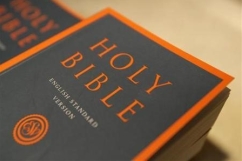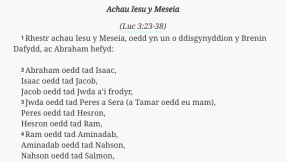Humour's a very personal thing. I can't understand anyone not liking Father Ted, for instance, though I have friends who find it tedious. Not Going Out is a hoot, as is The Big Bang Theory, but other friends roll their eyes at my low taste in comedy. I'll miss Jon Stewart's Daily Show, too.
I wish I could remember the scripture passage I was reading as a child when I laughed out loud. I was with my grandmother, a rather severe lady at times, and recall her saying: "The Bible is not generally regarded as a humorous book."
Well, maybe not: but maybe that's partly because humour doesn't always travel well, in time or space. The Bible was finished a couple of thousand years ago, in languages strange to most of us and in cultures strange to all of us. It's not surprising that we miss some of the cues. And of course, we're conditioned to that whole not-a-humorous-book approach. Maybe it isn't – but some of it is.
I don't believe the person who recorded the death of King Jeroham in 2 Chronicles 21:20, writing: "He passed away, to no one's regret" lacked humour.
And what about David in 1 Samuel 21:15-16? He pretends to be insane before Achish, king of Gath, to avoid being returned to Saul. Achish says to his servants: "Am I so short of madmen that you have to bring this fellow here?" That's funny.
Elijah's fond of sarcasm, too. His great contest with the prophets of Baal over which God could light his own sacrifice – a pretty comical idea in itself – sees him mocking them (1 Kings 18:27) with the suggestion that he might be on the lavatory, though politer translations tend to obscure this point.
I've always enjoyed Balaam's conversation with his donkey (Numbers 22: 21-30). I can't believe that the words: "Am I not your own donkey? Have I been in the habit of doing this to you?" were written with a straight face. And then there's Jonah. Not only was he thrown into the sea and sicked up by a fish, but the crowning misery was still to come: the inhabitants of Nineveh wouldn't perish in fire and brimstone after all, but actually repented. The image of the prophet sulking under the shade of a vine because God spared the people is just priceless – and then when "God provided a worm, which chewed the vine so that it withered", the comedy is complete: all this, and sunstroke too.
Proverbs, of course, is a goldmine of humour, not all of it very politically correct. "Like a gold ring in a pig's snout is a beautiful woman who shows no discretion" (11:22); "Better to live on a corner of the roof than share a house with a quarrelsome wife" (21:9). Or how about 22:13? "The sluggard says, 'There is a lion outside!' Or, 'I will be murdered in the streets!'" Anything but get out of bed. Teenagers don't change.
My favourite bit of Old Testament humour? It's one of those that works best read aloud. Daniel 3 tells of Nebuchadnezzar's burning fiery furnace, into which everyone who doesn't fall down and worship him are to be thrown (really? That's funny? I can hear my grandmother now). But notice the repetition of those long lists: "the satraps, prefects, governors, advisers, treasurers, judges, magistrates and all the other provincial officials" (2); then again in verse 3; then there's the list of instruments, "As soon as you hear the sound of the horn, flute, zither, lyre, harp, pipes and all kinds of music you must fall down and worship the image of gold..." (5, 7, 10, 15). It is absurdity piled on absurdity, the accumulation of impressive titles and an impressive orchestra designed to create the impression of an irresistible force – which hits the buffers when three Jews say, "Shan't." Read it with an ear for the comedy, and it's hilarious.
We won't get all the biblical humour, any more than we get all the humour in Shakespeare or Chaucer. Language and culture are barriers. Humour dates (I used to laugh at Abbott and Costello as a child, can you believe it?) though it's there for those with eyes to see.
But does it matter? I think so. The inspired word of God comes to us through human voices – and humour is part of what it is to be human. The biblical writers saw the funny side of things, too. They enjoyed sarcasm, they were witty, they liked showing us how people revealed their true selves in their bad temper and pique. The biblical writers laughed as they wrote . I think they'd like it if we sometimes laughed as we read.
Follow @RevMarkWoods on Twitter.


















